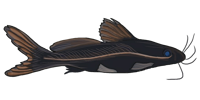We asked what they had been feeding it and was told goldfish
The same night we brought it home, it spit out 1/2 a goldfish
We have it in a 10G for now, eventually going into a 180G with another adult Lima.
Have tried feeding it some krill(the one in the 180 loves it) with no success, tried feeding it a small worm and a nightcrawler cut in 1/2 with no success.
So it's had nothing to eat in 9 days, it still looks good(not too thin) but yeah, any suggestions?




